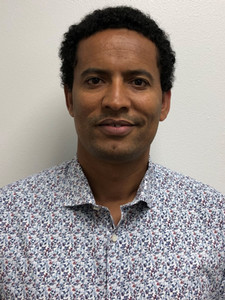OSE Seminar by Dr. Wassie Takele on Molecular Properties in Optically Confined Environments
Departmental News

Posted: November 11, 2024
Date: Thursday, November 14, 2024
Time: Noon to 1:00 PM
Location: PAIS Room 2540 and Zoom
Speaker:
Dr. Wassie Takele
UNM Chemistry and Chemical Biology
Abstract:
In this talk, I will discuss the interactions between light and matter in optically confined environments, focusing on their implications for controlling spectral properties and intermolecular interactions. I will begin by describing how the integration of voltage-tunable microcavities with spectroscopy can be utilized to modulate the infrared absorption and Raman scattering properties of molecules through the confined optical fields of the microcavity. Next, I will explain how the photophysical properties and tautomerization dynamics of individual phthalocyanine molecules can be influenced by the Purcell effect of an optical microcavity, utilizing confocal laser scanning microscopy and time-resolved fluorescence techniques. Finally, I will highlight our recent results obtained using scattering-type scanning near-field optical microscopy (s-SNOM), which employs an electromagnetic field confined at the apex of a metalized AFM tip to probe nanoscale chemical domains that traditional diffraction-limited techniques cannot access. We have successfully employed this technique to map nanoscale domains in electrochromic materials and battery electrolytes and to investigate the nanoscale morphologies that facilitate chiral transfer from small molecules to polymers. However, in the interest of time, I will focus on how s-SNOM imaging paves the way for a deeper understanding of the spatial variation in hydrogen bonding in polymer blends and interfacial phenomena at the molecular level.
Biography:
Wassie Takele is a postdoctoral scholar at the University of New Mexico, specializing in infrared chemical imaging and nano-spectroscopy of a wide range of functional materials, including polymer blends, colloidal nanoparticles, ionic liquids, and carbon dots. He earned his Ph.D. through a collaborative project between the Institute of Physical Chemistry in Poland and the University of Tübingen in Germany. In his doctoral research, he demonstrated how light-matter interactions within optical microcavities can be harnessed to modulate the spectral and photophysical properties, as well as the excited-state reactivity of single molecules. His academic pursuits have been supported by prestigious European Union scholarships, including the Marie Skłodowska-Curie Fellowship for his Ph.D. and the Erasmus Mundus Scholarship for his multiple master’s degrees at European universities. He holds a B.Sc. degree in Chemistry from Arba Minch University and an M.Sc. degree in Physical Chemistry from Addis Ababa University in Ethiopia.
